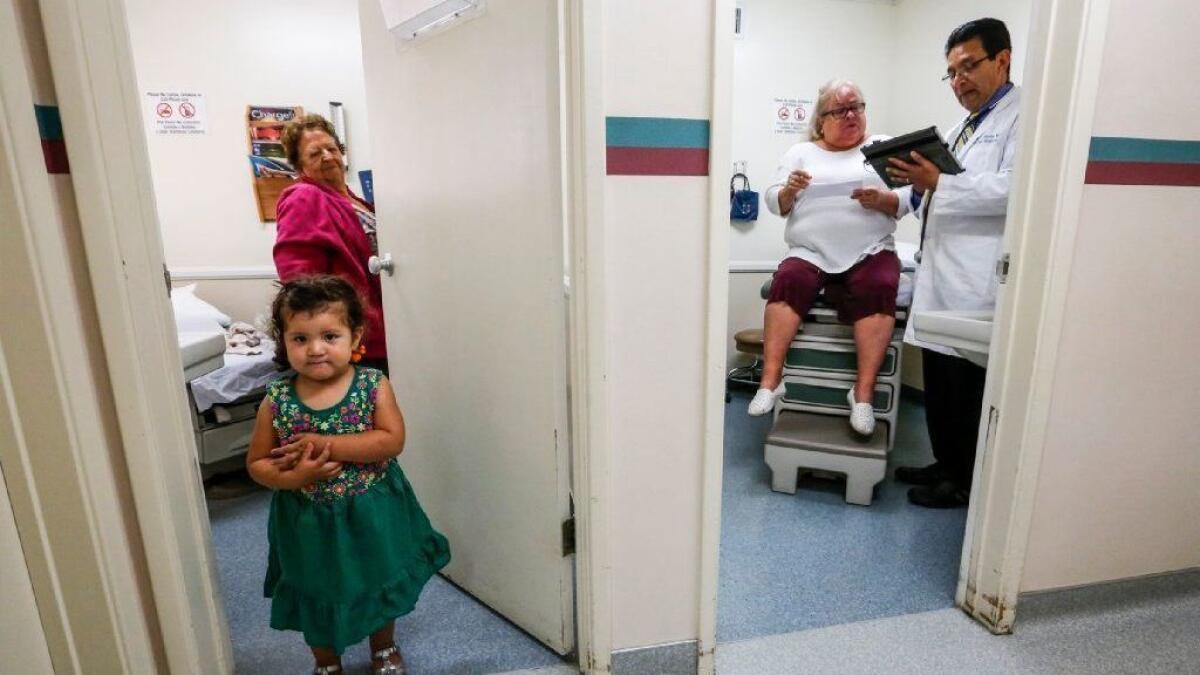$3 billion is needed to address California’s doctor shortage, task force says

- Share via
Reporting from Sacramento — California lawmakers will need to grant nurse practitioners across the state more autonomy, increase opportunities to study medicine and expand doctor training programs in order to avoid a looming healthcare crisis, according to a report released Monday by the California Future Health Workforce Commission.
The report outlines a $3-billion plan for ensuring the state has enough doctors, nurses and home care workers to meet the needs of Californians at a time when Gov. Gavin Newsom wants to dramatically expand healthcare access for lower-income and immigrant communities. The commission, created by healthcare, education and business leaders and co-chaired by UC President Janet Napolitano, plans to pitch the proposal to Newsom and legislative leaders in the coming weeks.
“In short, we know that California will be facing a tremendous workforce gap in the healthcare arena and we just can’t put this issue off,” Napolitano said.
Newsom has proposed extending Medi-Cal coverage to young adults who are in the U.S. illegally and providing more subsidies for middle-class families struggling to afford health insurance. That expansion comes as the state is expected to face a massive workforce shortage in the next decade, with California needing 4,100 more doctors and 600,000 additional home care workers, the commission said.
At the same time, more than one-third of the state’s doctors and nurse practitioners are reaching retirement age.
The report says the $3-billion price tag could be paid for through various resources including state, health systems, medical groups and private industry.
The most controversial proposal is a recommendation to allow nurse practitioners to work independently of doctors. California is one of 28 states that require nurse practitioners to work under a doctor’s oversight. The California Medical Assn., which represents doctors, has fought previous legislative efforts to expand nurse practitioners’ scope of practice and expressed concerns Monday about the current proposal.
“We continue to oppose efforts to lower standards of care to expand access,” said Janus Norman, senior vice president of governmental relations for the California Medical Assn. “Nurse practitioners, while hugely important to the healthcare delivery system and an integral part of medicine, do not have the same level of training and expertise, and we should be wary of creating a system that only allows those patients who can pay top dollar access to a fully trained and licensed physician.”
The California Assn. for Nurse Practitioners applauded the recommendation, with the group’s president, Karen Bradley, saying it would “provide the direct access to quality healthcare that many Californians desperately need.”
The commission also recommended that the state focus on increasing the number of healthcare workers from diverse communities by recruiting and preparing more students from underrepresented and low-income communities, as well as implementing incentives such as student loan forgiveness and scholarships for students who pledge to work in rural areas of the state where shortages are most severe.
An Emerging California Health Leaders Scholarship program would cover the full cost of tuition for 3,810 low-income, first-generation or underrepresented students enrolled in health training programs in high-need professions, according to the report. In exchange, students would commit to working for three years in an underserved community.
With an aging baby boomer population that will drastically increase the need for in-home health workers, the commission recommended overhauling the profession to address high levels of turnover. The task force says the state should create a new job classification with three tiers so that in-home workers can earn more money upon completing additional training.
To help increase the number of doctors, including psychiatrists, California must expand the number of residency positions offered, the commission said, adding that the state has historically underfunded those programs.
“In shortage areas, what patients say over and over is that they face long wait times, travel long distances to see specialists or can’t find a doctor in their area who understands their needs. Bottom line: We need more workers to meet this demand,” said Dr. Rishi Manchanda, a member of the commission.
Coverage of California politics »
Follow @MelodyGutierrez on Twitter and sign up for our Essential Politics newsletter.
More to Read
Get the L.A. Times Politics newsletter
Deeply reported insights into legislation, politics and policy from Sacramento, Washington and beyond. In your inbox three times per week.
You may occasionally receive promotional content from the Los Angeles Times.











